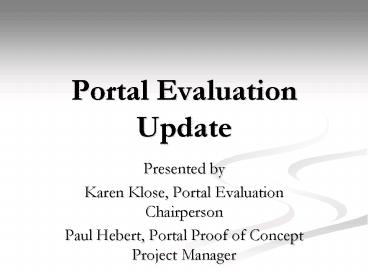Portal Evaluation Update - PowerPoint PPT Presentation
1 / 38
Title:
Portal Evaluation Update
Description:
Adam Rybicki. Freddy Lopez. Andrew Wills. System Administration. Alex DeMarco ... Open-source development tools and products (Eclipse, ant, Tomcat, uPortal) ... – PowerPoint PPT presentation
Number of Views:35
Avg rating:3.0/5.0
Title: Portal Evaluation Update
1
Portal Evaluation Update
- Presented by
- Karen Klose, Portal Evaluation Chairperson
- Paul Hebert, Portal Proof of Concept Project
Manager
2
Agenda
- Portal Evaluation Phases
- Portal Requirements Survey Results
- Proof of Concept (POC)
- Timeline
- Standards Discussion
3
Portal Evaluation Phases
- Determine SUNY Portal Requirements
- Proof of Concepts
- Due Diligence
- Determine Total Cost of Ownership
- Report Findings
4
Survey Results
- Respondent Locations
- 6 University Colleges
- 1 Health Science
- 2 Colleges of Technology
- 8 Community Colleges
- 3 System Administration
- 20 Total Respondents
- Respondent Positions
- 1 Faculty/Staff
- 8 Technical
- 4 Business Administration
- 3 Other
- 4 Unreported
5
General Questions
- Familiarity with portal technology
- 9 reported familiar
- 11 reported most familiar
- Considering implementing a portal
- 16 reported YES
- 1 reported NO
- 3 reported N/A
- How soon would you like to implement?
- 4 as soon as possible
- 11 near future
- 1 no time soon
6
Collaboration Tools
7
(No Transcript)
8
(No Transcript)
9
(No Transcript)
10
(No Transcript)
11
(No Transcript)
12
Portal IntegrationMost Important
- Email Services
- Calendaring Services
- Portal Communications Services
- Student Information Services
- Content Management
- Course Management
- Library Services
- Electronic Course Delivery
13
Portal Integration Least Important
- Document Management
- Online Training
- Workflow Features
- Productivity Tools
14
Availability Accessibility FeaturesAll rated
as Very Important
- 24x7x365 availability
- Desktop availability
- On campus/ Off campus availability
- Compliant with ADA
15
Personal Productivity Features
- Rated average to Very Important
- Easy-to-use interface
- Single-sign-on
- Applications available everywhere
- Self-registration of new users
- Device support
- Rated average to not important
- Bookmarks
- Customization
16
Administration FeaturesIn order of most
importance per respondents
- Server backup and restoration
- Secure web connectivity
- Assignable privilege sets (roles, groups)
- Secured communications (HIPAA, etc.)
- Support for authentication methods (LDAP, X.500
digital certificates, proprietary, other
standards) - Security Updates
- Enhanced SSL
17
Administration Features contd.
- Identity management services
- Distributed or delegated administration and
authorization/de-authorization - Portlet-level privileges customizable to
application and person - Simplified portal add-on and patch pkg.
procedures - Automated portal performance monitoring alerts
- Server application scaled configuration
capability - Authoring and publishing privileges
18
Extensibility FeaturesAll were rated important
to very important
- Standards compliance
- Portlet features
- Portlet data sources (Web, XML, Web Services,
SQL) - Portal integration features
- Framework features
- General framework requirements
- Standards compliance
- Development Platform
19
Questions?
20
Why a Proof of Concept?
- Viable solutions (open source core or licensed)
- Prove
- Environment
- Knowledge Transfer
- Authentication/Authorization
- Total Cost of Ownership
21
Proof of Concept
- Selected
- Unicon Consulting Group
- CampusEAI Consortium
- SunGard SCT
- SUNY Team
- SUNY Project Manager
22
Timeline
- 1st Proof -- May
- 2nd Proof July
- 3rd Proof September
- Due diligence-ongoing
- Total cost of ownership - October
- Final report - October
- Presentation at Fall WIZARD - November
23
Unicon Proof of ConceptApril 26-May 13 2005SUNY
Participants
- Unicon Participants
- Adam Rybicki
- Freddy Lopez
- Andrew Wills
24
Standards Discussion Points
- Open-source development tools and products
(Eclipse, ant, Tomcat, uPortal) - JA-SIG standards body and standards process
(JSR-168 and WSRP 1.0) - Yales Common Authentication Service (CAS)
- Lightweight J2EE development frameworks (Spring
Framework) - Agile development methodologies and
evidence-based development practices
25
(No Transcript)
26
(No Transcript)
27
(No Transcript)
28
(No Transcript)
29
n-tier authentication problem
Channel
Portal
30
CAS in a nutshell
Authenticates via password (once)
Determines validity of users claimed authenticat
ion
Authenticates without sending password
Browser
Web application
31
How CAS Works
S
T
Web application
CAS
NetID
S
T
Web browser
C
32
(No Transcript)
33
(No Transcript)
34
(No Transcript)
35
(No Transcript)
36
(No Transcript)
37
Reference Sites uPortal http//www.uportal.org J
A-SIG http//www.ja-sig.org Eclipse http//www
.eclipse.org Jakarta http//apache-jakarta.org C
AS http//jasigch.princeton.edu9000/display/CAS
Spring http//www.springframework.org Agile
Development http//www.agilealliance.org
38
Your questions and feedback are much appreciated!
- This presentation will be available on the STC
website following the conference.































